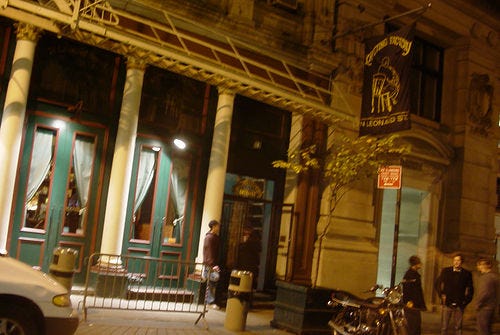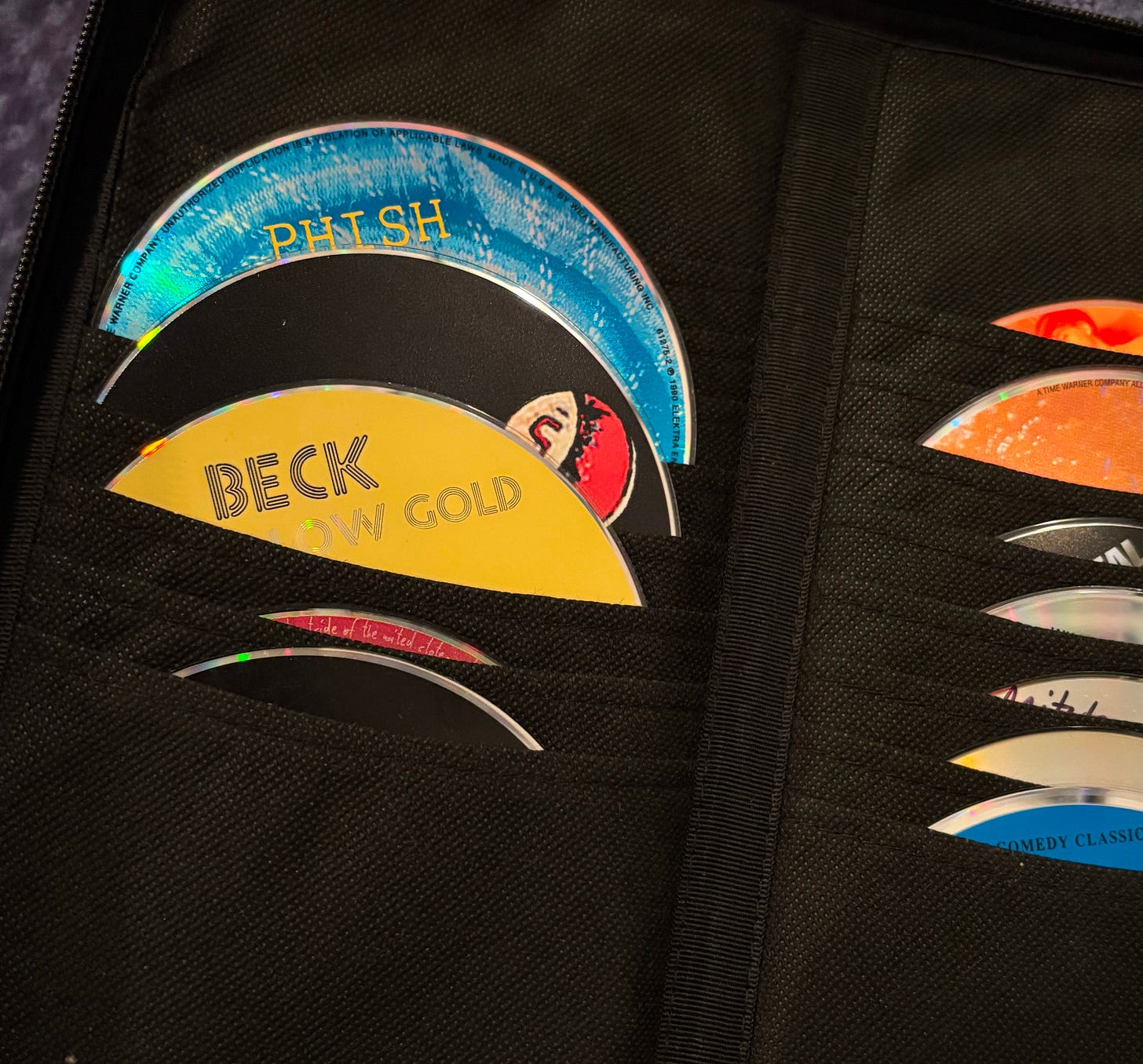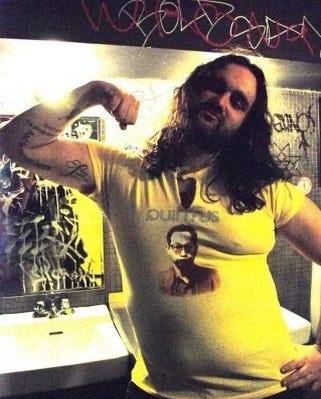007 - Key Notes No. 2: Quintus
Remembering a band and a friend -- both gone too soon
Key Notes is a recurring series in which I write
about music I like
Reuben Chess was found dead in the stairwell of a Bronx apartment building on December 13th at the age of 39.
I first found Reuben — very much alive — in the classroom of our local JCC’s pre-nursery program at the age of 3. We were both first-born sons to young suburban New York couples, both adjusting to our new roles as big brothers to baby sisters (the coming years would add three more lil’ sisses under Reuben’s wing, God bless him).
My memories of our nascent friendship are understandably vague — I recall breaking a window at his house with an errant baseball throw and feeling damned to eternal hell/grounding for the transgression — and as we went our separate ways for elementary school > middle school > high school, we inevitably lost touch. But our parents remained friends, and I believe it was at my mom’s mention that Reuben was competing in the Westchester Jewish Center’s “Battle of the Bands” that inspired me to attend and reconnect with this kid, who had since established himself as a singing/songwriting/guitar-shredding prodigy and whose band Terraplane took home first prize that night.
Terraplane soon evolved into Dr. Meeker, which managed to score a gig headlining The Tap Bar at the vaunted Knitting Factory in Tribeca — far and away the coolest thing anyone I personally knew was doing at that underage stage in life. By then I was fully invested in the Reuben Rock Stock. Fashioning myself part groupie, part roadie, part booking agent — my finest coup was finagling a Reuben performance at my high school’s annual springtime student concert (meant exclusively for bands comprised of my high school’s students) by agreeing to hold down the maracas in his ensemble, officially making me PART OF THE BAND for one night only — I was willing to do whatever it took to speed along Reuben’s ascension to indie rock darlingdom.
Reuben headed to NYU in the fall of 2003, ditching Dr. Meeker for a new outfit quickly assembled from among his freshman cohort and a couple of older kids in the jazz program. It was a five-piece called Quintus: Reuben on lead guitar/vox, fellow Westchester wunderkind Ari Friedman on second guitar (frequently and deftly deploying the slide), Dan Kreiger on keys, Dave Dawda on bass, and Mike Riddleberger on drums.
Legend has it Reuben booked the band’s first gig (at The Baggot Inn) before their first rehearsal, even before the band had been fully formed (the booking is what convinced a reluctant Riddleberger to join). Within three weeks, they had cut a demo record with nine songs Reuben had been steadily honing through adolescence.
This was the first track on that first self-produced, self-published CD that I recently unearthed in my binder, hiding between Phish’s Lawn Boy and Beck’s Mellow Gold:
“Brooklyn” by Quintus (2003)
It’s an expert composition to my humble ears, from Mike’s bright opening crash and shuffles coupled with Reuben and Ari’s layered arpeggios, which transition as a slightly upturned variation into the verse melody, to Reuben’s harmonica floating over the top, Dave’s upright bass filling out the bottom, and Ari’s slide rounding off the verse and sending us into that achingly beautiful chorus — whose namechecking of Cortelyou confused the hell out of me upon my first dozen listens until I finally had to ask Reuben “What exactly are you saying there? Oh, it’s a street in Brooklyn? And the song is called ‘Brooklyn.’ Makes sense.”
And then suddenly, a shift in gears: Mike and Dave bust out their Jazz Studies chops, Dan treats us to a classical sonata, harmonica and slide rejoin the fray as the crescendo segues into the closing chorus and a bookending outro. Quintessential Quintus.
The band caught fire, gigging around downtown at places like the Lion’s Den on Sullivan, Piano’s on Ludlow, Bowery Poetry Club (on, you guessed it, Bowery), and the tried and true Baggot Inn on West 3rd. Managers came circling, then publicists and record labels. Josh Deutsch and his newly founded Downtown Records won the bidding war, making Quintus his second artist signing after Gnarls Barkley. Josh had a connect to Levon Helm, and before they knew it Reuben & Co were in Woodstock cutting an EP at The Barn, with production and percussive assistance from the legendary Last Waltzer.
In a nod to their new friend and collaborator, they named the EP The Shape We’re In, and in homage to their East Village roots, they commissioned album art from none other than The Mosaic Man himself.
I had been keeping tabs on all things Reuben and Quintus from my campus in Baltimore, where I weaseled my Student Activities Board to pony up a few thousand dollars to bring the band down for what effectively became a private concert for me and my friends. During that heady summer of 2006 when I took my first giant leap in pursuit of a comedy career, I caught as many Quintus shows as I could between gigs of my own. It’s because of Quintus that I can proudly claim to have contributed to the mythical mess that was the CBGB bathroom, my urine mixing with the piss of Ramones’ and Murder Junkies’ past.
While most of us college seniors were scratching our heads to determine what the hell we were going to do with our lives when this four-year party ended, Quintus was on a surefire path to stardom. The strength of their EP earned them their first mini tour, opening for Rusted Root on a handful of northeast dates, and on a cold night in February 2007 I drove down to DC and throbbed with vicarious thrill as my friends took the stage at the 1,200 cap 9:30 Club, proceeding to tear the roof off the sucker. Don’t take my word for it! Here’s a random review I excavated from GratefulWeb.com:
On tour with [Rusted Root] came a little known band named Quintus from New York. This young and very talented group utilized catchy guitar riffs, even catchier lyrics, and solid musicianship. It's always refreshing when a young band takes the time to focus on quality song-writing, thoughtful lyrics, and harmonies instead of trying to emulate the bland top forty genre that is too prevalent today. Look for these guys to become much more popular in the years to come if they continue on their current path.“… if they continue on their current path.”
It didn’t seem like a big “if” at the time…
Next stop on the Quintus Express was a two-week studio session in Los Angeles with noted producer Tom Rothrock to cut a proper debut album, and just as The Strokes had done in our backyard a few years prior, become an internationally chart-topping ‘overnight success.’
But the album was not to be. The charts were not to be topped. The success would be cut short, peaking as Rusted Root support. What began as an unfortunately timed bout of TMJ that struck Reuben just as the guys were settling into their LA sessions developed into a full blown anxious-depressive attack that sidelined the singer and handicapped the band. They returned to New York empty-handed, momentum stalled, concerned and confused over Reuben’s mental state.
Reuben had always exuded a preternatural coolness and confidence in his manner and about his music. He seemed to know in his bones, from a very young age, that he was going to “make it big” and that the road would be easy for him. And up until this point in his charmed life, it had been. But now the first cracks appeared. Had his stoic facade belied the pressure-cooked contents of a rockstar-in-waiting? Was it purely a matter of imbalanced brain chemicals, bad genetic luck and bad timing? A combination of it all?
Hindsight pinpoints this aborted album recording as the beginning of the end for Quintus, and for Reuben. With graduation came the departure of Ari and Dan and the deprioritization of the band for Mike and Dave (who have consistently been in-demand and working musicians — Mike currently drums in Jack Antonoff’s Bleachers; Dave plays bass with Eric D. Johnson’s Fruit Bats). Reuben continued to keep the Quintus spirit alive and gigging around town, and I continued to attend whenever I could, at Pete’s Candy Store, at Rockwood Music Hall, at The Living Room.
But Reuben was slowly coming undone. He was getting harder to work with, harder to be friends with. He had always had an off-kilter sense of humor, but his jokes were taking on a harder edge, more aggressive, tinged with threats of violence to the point where you had to remind yourself that he was joking, right? And then one day towards the end of 2013, the levee broke. It started with a public meltdown on Facebook, ripping into every one of his “friends” with vile and abusive rants, but ended with physical attacks on members of his own family and fighting with police who were called to restrain him.
For many of us who had been close to Reuben, his apology email was the last we’d hear from him until his death notice. It was as if his disease — ultimately diagnosed as severe bipolar disorder with psychotic features — had already taken him. I received a few other odd emails in the decade since, but I stopped responding when it was clear his illness was still in the driver seat.
I checked in many times with this family about his whereabouts and condition over the years, and the answer was always “nothing good.” He’d be on and off medication, in and out of crisis centers, therapy programs, and outpatient care facilities. Eventually — seemingly impossibly — this nice Jewish boy who attended Solomon Schechter and NYU, this creative genius who recorded with Levon Helm, who was signed to Downtown Records, who was on the precipice of potential platinum record certification… was homeless and begging on the streets for change.
At lunch after Reuben’s funeral service, Mike shared a true horror story from last November:
I was walking in Williamsburg with my boyfriend, and I heard this weak voice say "Mike?" I turned around, and it was Reuben. But, barely. His hair and beard were overgrown and matted, he reached out to shake my hand, and his hand looked like it had been to war. Cracked, filthy, the hand of a street person. I was set to play The Tonight Show with Bleachers the following night, and all I could think was, "I should be playing The Tonight Show with Reuben."In thinking of Reuben’s life and career, I keep returning to the classic Neil Young lyric, “It’s better to burn out than to fade away.” Did Reuben burn out? Did he fade away? Did he somehow do both? What is, in fact, better?
Thankfully, his music will never fade. You won’t find Quintus on Spotify — or rather, you won’t find the right Quintus (apparently there is a Scandinavian brass band with the same name) — but Reuben’s bandcamp remains active, with a collection of Quintus recordings and some solo things he managed to put out during periods of clarity. There is talk among the friend group about releasing more of his archival music as part of a podcast or documentary or something down the road.
In the meantime, we’ll keep on rockin’ for Reubs.
If you’re looking to make a last minute, end-of-year donation, these are some organizations to support in Reuben’s honor:
www.fountainhouse.org
www.ohelfamily.org
www.nyp.org/psychiatry/psychotic-disorders/second-chance-program
www.nami.org













Sorry for your loss. Every well-meaning soul deserves a beautiful and dignified tribute like this.
Such a beautiful tribute, Scott. Thank you for sharing. 🙏